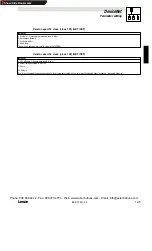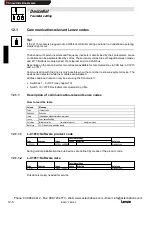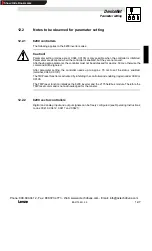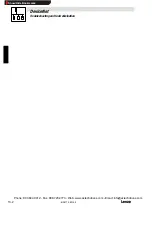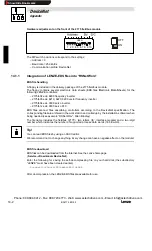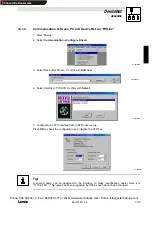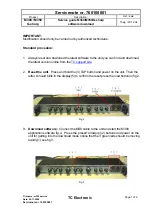
DeviceNet
12
Parameter setting
12-1
L
BA2175 EN 2.0
12
Parameter setting
General information
Ensure to use the terminology defined for the DeviceNet communication profile.
Two different telegram types are transferred between host and controller(s):
•
Parameter data (explicite messages)
•
Process data (I/O messages)
As indicated in the table, these telegram types are subdivided into communication channels
according to their time-critical response.
Communication channel
Telegram type
à
Parameter data channel (chapter 6.2)
à
Parameter data (explicite messages)
– Enables the access to all Lenze codes.
– Parameter changes are normally saved in the controller (observe
C0003).
– If the parameter channel is active, it assigns 4 words of the input
and output process data.
^
6-5 )
– operating parameters
– diagnostics information
– motor data
In general, the parameter transfer is not as time-critical as the
tranfer of process data.
à
Process data channel (chapter 6.3)
à
Process data
– The controller can be controlled using process data (
^
6-13 ).
– The host has direct access to the process data. In the PLC, for
instance, the data are directly assigned to the I/O area.
– Process data are not stored in the controller and cyclically
exchanged between host and controller (continuous exchange of
current input and output data).
Process data are, for instance, setpoints and actual values. Process
data must be exchanged between host and controller as quickly as
possible. Process data are usually small amounts of cyclically
transferred data.
•
I/O polled messages (polled)
– The poll command sent by the master contains output data for
the slave. The slave then sends its input data to the master.
The Poll response can also be used as receive message.
•
Cyclic I/O
– With cyclic I/O master and slave generate their data
independently of each other. The data is sent as set through
the timer. The timer value is to be entered by the user. In
default setting the cyclic I/O message is to be acknowledge by
the consumer. If the timer cycle is set to a high value, the
user can suppress the acknowledgements.
•
Change of state (COS)
– This type of I/O message is a special type of cyclic message.
COS nodes send their data when the data status changes or
the heartbeat interval set by the user has expired. The
heartbeat interval is set by means of the cyclic timer.
NOTE:
The default message type for 2175 DeviceNet modules is the I/O
polled message. Other message types can be enabled using the
DeviceNet Manager.
Tab. 12-1
Distribution of parameter data and process data to different communication channels
Phone: 800.894.0412 - Fax: 888.723.4773 - Web: www.actechdrives.com - Email: [email protected]
Show/Hide Bookmarks



















